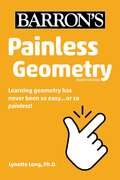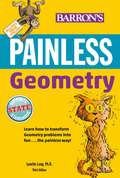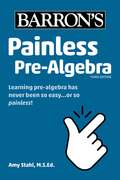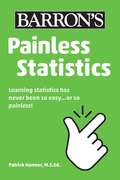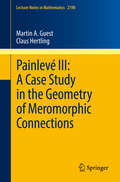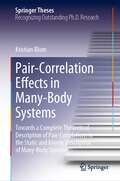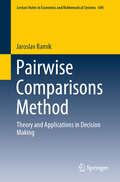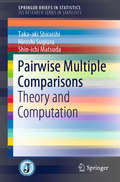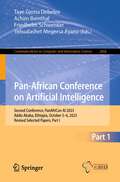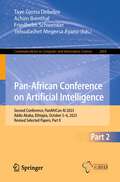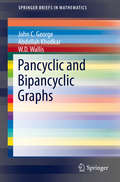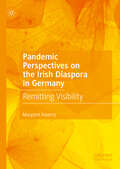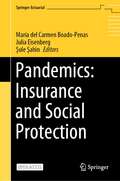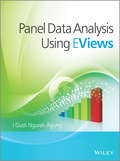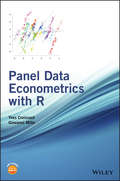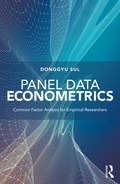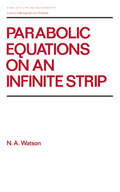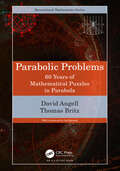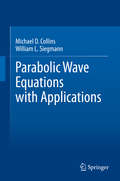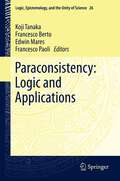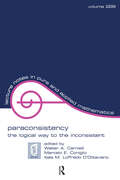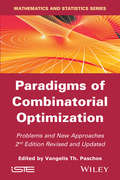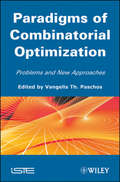- Table View
- List View
Painless Geometry (Barron's Painless)
by Lynette Long Ph.D.Barron's makes learning Geometry fun and PAINLESS!Painless Geometry provides lighthearted, step-by-step learning and includes:Characteristics of distinct shapes, such as circles, quadrilaterals, and trianglesDiscussion on how geometric principles can solve real-world problemsPainless tips, common pitfalls, instructive tables, diagrams, &“brain tickler&” quizzes and answers throughout each chapter, and more.
Painless Geometry (Painless Series)
by Lynette LongThe thought of solving theorems or postulates leaves some students quivering in their boots. . . but not anymore! <P><P>This must-have guide takes the pain out of learning geometry once and for all. The author demonstrates how solving geometric problems amounts to fitting parts together to solve interesting puzzles. <P><P>Students discover relationships that exist between parallel and perpendicular lines; analyze the characteristics of distinct shapes such as circles, quadrilaterals, and triangles; and learn how geometric principles can solve real-world problems. <P><P>Like all titles in Barron's Painless Series, this book presents informal, student-friendly approaches to learning geometry, emphasizing interesting details, outlining potential pitfalls step by step, offering "Brain Tickler" quizzes, and more.
Painless Pre-Algebra (Barron's Painless)
by Amy Stahl M.S. Ed.Learning at home is now the new normal. Need a quick and painless refresher? Barron&’s Painless books make learning easier while you balance home and school. Teaches basic algebra, exponents and roots, equations and inequalities, and polynomials.Titles in Barron's extensive Painless Series cover a wide range of subjects, as they are taught at middle school and high school levels. Perfect for supporting Common Core Standards, these books are written for students who find the subjects somewhat confusing, or just need a little extra help. Most of these books take a lighthearted, humorous approach to their subjects, and offer fun exercises including puzzles, games, and challenging "Brain Tickler" problems to solve. Bonus Online Component: includes additional games to challenge students, including Beat the Clock, a line match game, and a word scramble.
Painless Statistics (Barron's Painless)
by Patrick HonnerWhether you&’re a student or an adult looking to refresh your knowledge, Barron&’s Painless Statistics provides review and practice in an easy, step-by-step format.An essential resource for:Virtual learningHomeschoolLearning podsSupplementing classes/in-person learningInside you&’ll find:Clear examples for all topics, including data and distributions, basic probability, confidence intervals, bivariate statistics, and much moreDiagrams, charts, and instructive math illustrationsPainless tips, common pitfalls, and informative sidebarsMath talk boxes that translate complex &“math speak&” into easy-to-understand languageBrain Tickler quizzes throughout each chapter to test your progress
Painlevé III: A Case Study in the Geometry of Meromorphic Connections (Lecture Notes in Mathematics #2198)
by Martin A. Guest Claus HertlingThe purpose of this monograph is two-fold: it introduces a conceptual language for the geometrical objects underlying Painlevé equations, and it offers new results on a particular Painlevé III equation of type PIII (D6), called PIII (0, 0, 4, −4), describing its relation to isomonodromic families of vector bundles on P1 with meromorphic connections. This equation is equivalent to the radial sine (or sinh) Gordon equation and, as such, it appears widely in geometry and physics. It is used here as a very concrete and classical illustration of the modern theory of vector bundles with meromorphic connections. Complex multi-valued solutions on C* are the natural context for most of the monograph, but in the last four chapters real solutions on R>0 (with or without singularities) are addressed. These provide examples of variations of TERP structures, which are related to tt∗ geometry and harmonic bundles. As an application, a new global picture o0 is given.
Paint Technology Handbook
by Rodger TalbertModern paints and coatings offer an astounding variety of formulations that are used to improve the durability, appearance, and lifespan of countless products. From cars to furniture, computers, and mechanical components, paints and coatings play a vital role in nearly every manufactured product available. Written by an industry insider with more than 30 years of experience, the Paint Technology Handbook provides a primary, one-stop resource for designing and operating optimal paint and surface finishing systems. The book examines system components and how surface preparation affects performance. It describes the chemical components of paints, relevant color theories, and analytical methods used for color matching and control. The book presents a complete evaluation of liquid paint application technologies, including spray and electrodeposition techniques. Concluding chapters cover curing, testing methods for finished materials, quality control techniques, and performing cost analyses.
Pair-Correlation Effects in Many-Body Systems: Towards a Complete Theoretical Description of Pair-Correlations in the Static and Kinetic Description of Many-Body Systems (Springer Theses)
by Kristian BlomThe laws of nature encompass the small, the large, the few, and the many. In this book, we are concerned with classical (i.e., not quantum) many-body systems, which refers to any microscopic or macroscopic system that contains a large number of interacting entities. The nearest-neighbor Ising model, originally developed in 1920 by Wilhelm Lenz, forms a cornerstone in our theoretical understanding of collective effects in classical many-body systems and is to date a paradigm in statistical physics. Despite its elegant and simplistic description, exact analytical results in dimensions equal and larger than two are difficult to obtain. Therefore, much work has been done to construct methods that allow for approximate, yet accurate, analytical solutions. One of these methods is the Bethe-Guggenheim approximation, originally developed independently by Hans Bethe and Edward Guggenheim in 1935. This approximation goes beyond the well-known mean field approximation and explicitly accounts for pair correlations between the spins in the Ising model. In this book, we embark on a journey to exploit the full capacity of the Bethe-Guggenheim approximation, in non-uniform and non-equilibrium settings. Throughout we unveil the non-trivial and a priori non-intuitive effects of pair correlations in the classical nearest-neighbor Ising model, which are taken into account in the Bethe-Guggenheim approximation and neglected in the mean field approximation.
Pairwise Comparisons Method: Theory and Applications in Decision Making (Lecture Notes in Economics and Mathematical Systems #690)
by Jaroslav RamíkThis book examines relationships between pairwise comparisons matrices. It first provides an overview of the latest theories of pairwise comparisons in decision making, discussing the pairwise comparison matrix, a fundamental tool for further investigation, as a deterministic matrix with given elements. Subsequent chapters then investigate these matrices under uncertainty, as a matrix with vague elements (fuzzy and/or intuitionistic fuzzy ones), and also as random elements. The second part of the book describes the application of the theoretical results in the three most popular multicriteria decision-making methods: the Analytic Hierarchy Process (AHP), PROMETHEE and TOPSIS. This book appeals to scholars in areas such as decision theory, operations research, optimization theory, algebra, interval analysis and fuzzy sets.
Pairwise Multiple Comparisons: Theory and Computation (SpringerBriefs in Statistics)
by Hiroshi Sugiura Taka-aki Shiraishi Shin-ichi MatsudaThis book focuses on all-pairwise multiple comparisons of means in multi-sample models, introducing closed testing procedures based on maximum absolute values of some two-sample t-test statistics and on F-test statistics in homoscedastic multi-sample models. It shows that (1) the multi-step procedures are more powerful than single-step procedures and the Ryan/Einot–Gabriel/Welsh tests, and (2) the confidence regions induced by the multi-step procedures are equivalent to simultaneous confidence intervals. Next, it describes the multi-step test procedure in heteroscedastic multi-sample models, which is superior to the single-step Games–Howell procedure. In the context of simple ordered restrictions of means, the authors also discuss closed testing procedures based on maximum values of two-sample one-sided t-test statistics and based on Bartholomew's statistics. Furthermore, the book presents distribution-free procedures and describes simulation studies performed under the null hypothesis and some alternative hypotheses. Although single-step multiple comparison procedures are generally used, the closed testing procedures described are more powerful than the single-step procedures. In order to execute the multiple comparison procedures, the upper 100α percentiles of the complicated distributions are required. Classical integral formulas such as Simpson's rule and the Gaussian rule have been used for the calculation of the integral transform that appears in statistical calculations. However, these formulas are not effective for the complicated distribution. As such, the authors introduce the sinc method, which is optimal in terms of accuracy and computational cost.
Pan-African Conference on Artificial Intelligence: Second Conference, PanAfriCon AI 2023, Addis Ababa, Ethiopia, October 5–6, 2023, Revised Selected Papers, Part I (Communications in Computer and Information Science #2068)
by Friedhelm Schwenker Taye Girma Debelee Achim Ibenthal Yehualashet Megersa AyanoThis two-volume set, CCIS 2068 and 2069, constitutes selected papers presented during the Second Pan-African Conference on Artificial Intelligence, PanAfriCon AI 2023, held in Addis Ababa, Ethiopia, in October 2023. The set goal of the conference is to exchange the best practices of joint Pan-African efforts to provide solutions for Africa’s key 21st century challenges in the social, economic and ecologic domains. The 29 papers were thoroughly reviewed and selected from 134 submissions. The papers are organized in the following topical sections: Medical AI; Natural Language Processing, Text and Speech Processing; AI in Finance and Cyber Security; Autonomous Vehicles; AI Ethics and Life Sciences.
Pan-African Conference on Artificial Intelligence: Second Conference, PanAfriCon AI 2023, Addis Ababa, Ethiopia, October 5–6, 2023, Revised Selected Papers, Part II (Communications in Computer and Information Science #2069)
by Friedhelm Schwenker Taye Girma Debelee Achim Ibenthal Yehualashet Megersa AyanoThis two-volume set, CCIS 2068 and 2069, constitutes selected papers presented during the Second Pan-African Conference on Artificial Intelligence, PanAfriCon AI 2023, held in Addis Ababa, Ethiopia, in October 2023. The set goal of the conference is to exchange the best practices of joint Pan-African efforts to provide solutions for Africa’s key 21st century challenges in the social, economic and ecologic domains. The 29 papers were thoroughly reviewed and selected from 134 submissions. The papers are organized in the following topical sections: Medical AI; Natural Language Processing, Text and Speech Processing; AI in Finance and Cyber Security; Autonomous Vehicles; AI Ethics and Life Sciences.
Pancyclic and Bipancyclic Graphs
by W. D. Wallis John C. George Abdollah KhodkarThisbook is focused on pancyclic and bipancyclic graphs and is geared toward researchersand graduate students in graph theory. Readers should be familiar with thebasic concepts of graph theory, the definitions of a graph and of a cycle. Pancyclicgraphs contain cycles of all possible lengths from three up to the number ofvertices in the graph. Bipartite graphs contain only cycles of even lengths, abipancyclic graph is defined to be a bipartite graph with cycles of every evensize from 4 vertices up to the number of vertices in the graph. Cutting edgeresearch and fundamental results on pancyclic and bipartite graphs from a widerange of journal articles and conference proceedings are composed in this bookto create a standalone presentation. Thefollowing questions are highlighted through the book: - What is the smallest possible number of edges in apancyclic graph with v vertices? - When do pancyclic graphs exist with exactly onecycle of every possible length? - What is the smallest possible number of edges in abipartite graph with v vertices? - When do bipartite graphs exist with exactly one cycle of every possiblelength?
Pandemic Perspectives on the Irish Diaspora in Germany: Remitting Visibility
by Margaret HavertyThis book reflects on how the pandemic impacted upon qualitative social research, but also how it affected the lives of the members of the Irish diaspora on the European continent. The crisis acted as a pressure cooker for those ‘living abroad,’ transforming distance and migration situations to resemble times gone by, when travel was far more prohibitive and emigration felt more permanent. At the same time, ‘expat lives’ were being thrown headlong into a new future, shaped more profoundly than ever by digital means. This work is a close examination of how Irish migrants in Germany construct their Irishness and, in doing so, maintain their belonging to Ireland across a geographic distance transformed by the pandemic. This work seeks to draw out the underlying patterns and meanings in the day-to-day practices of Irishness by members of Ireland’s putative diaspora in Germany by interweaving a multitude of ethnographic vignettes and rich interview material with relevant and interestingtheoretical concepts. Interlocutors see Ireland as a site of personal memory – good, bad and in-between – and of meaning-making practices. Ireland is deeply personal to them; that understood, their practices of belonging to Ireland are nonetheless embroiled in the political goal of making Ireland visible abroad.
Pandemics: Insurance and Social Protection (Springer Actuarial)
by María del Carmen Boado-Penas Julia Eisenberg Şule ŞahinThis open access book collects expert contributions on actuarial modelling and related topics, from machine learning to legal aspects, and reflects on possible insurance designs during an epidemic/pandemic.Starting by considering the impulse given by COVID-19 to the insurance industry and to actuarial research, the text covers compartment models, mortality changes during a pandemic, risk-sharing in the presence of low probability events, group testing, compositional data analysis for detecting data inconsistencies, behaviouristic aspects in fighting a pandemic, and insurers’ legal problems, amongst others.Concluding with an essay by a practicing actuary on the applicability of the methods proposed, this interdisciplinary book is aimed at actuaries as well as readers with a background in mathematics, economics, statistics, finance, epidemiology, or sociology.
Panel Data Analysis using EViews
by I Gusti AgungA comprehensive and accessible guide to panel data analysis using EViews softwareThis book explores the use of EViews software in creating panel data analysis using appropriate empirical models and real datasets. Guidance is given on developing alternative descriptive statistical summaries for evaluation and providing policy analysis based on pool panel data. Various alternative models based on panel data are explored, including univariate general linear models, fixed effect models and causal models, and guidance on the advantages and disadvantages of each one is given.Panel Data Analysis using EViews:Provides step-by-step guidance on how to apply EViews software to panel data analysis using appropriate empirical models and real datasets. Examines a variety of panel data models along with the author's own empirical findings, demonstrating the advantages and limitations of each model.Presents growth models, time-related effects models, and polynomial models, in addition to the models which are commonly applied for panel data.Includes more than 250 examples divided into three groups of models (stacked, unstacked, and structured panel data), together with notes and comments.Provides guidance on which models not to use in a given scenario, along with advice on viable alternatives.Explores recent new developments in panel data analysisAn essential tool for advanced undergraduate or graduate students and applied researchers in finance, econometrics and population studies. Statisticians and data analysts involved with data collected over long time periods will also find this book a useful resource.
Panel Data Econometrics with R
by Yves Croissant Giovanni MilloPanel Data Econometrics with R provides a tutorial for using R in the field of panel data econometrics. Illustrated throughout with examples in econometrics, political science, agriculture and epidemiology, this book presents classic methodology and applications as well as more advanced topics and recent developments in this field including error component models, spatial panels and dynamic models. They have developed the software programming in R and host replicable material on the book’s accompanying website.
Panel Data Econometrics: Common Factor Analysis for Empirical Researchers
by Donggyu SulIn the last 20 years, econometric theory on panel data has developed rapidly, particularly for analyzing common behaviors among individuals over time. Meanwhile, the statistical methods employed by applied researchers have not kept up-to-date. This book attempts to fill in this gap by teaching researchers how to use the latest panel estimation methods correctly. Almost all applied economics articles use panel data or panel regressions. However, many empirical results from typical panel data analyses are not correctly executed. This book aims to help applied researchers to run panel regressions correctly and avoid common mistakes. The book explains how to model cross-sectional dependence, how to estimate a few key common variables, and how to identify them. It also provides guidance on how to separate out the long-run relationship and common dynamic and idiosyncratic dynamic relationships from a set of panel data. Aimed at applied researchers who want to learn about panel data econometrics by running statistical software, this book provides clear guidance and is supported by a full range of online teaching and learning materials. It includes practice sections on MATLAB, STATA, and GAUSS throughout, along with short and simple econometric theories on basic panel regressions for those who are unfamiliar with econometric theory on traditional panel regressions.
Pappus of Alexandria: Book 4 of the Collection
by Heike Sefrin-WeisAlthough not so well known today, Book 4 of Pappus' Collection is one of the most important and influential mathematical texts from antiquity. The mathematical vignettes form a portrait of mathematics during the Hellenistic "Golden Age", illustrating central problems - for example, squaring the circle; doubling the cube; and trisecting an angle - varying solution strategies, and the different mathematical styles within ancient geometry. This volume provides an English translation of Collection 4, in full, for the first time, including: a new edition of the Greek text, based on a fresh transcription from the main manuscript and offering an alternative to Hultsch's standard edition, notes to facilitate understanding of the steps in the mathematical argument, a commentary highlighting aspects of the work that have so far been neglected, and supporting the reconstruction of a coherent plan and vision within the work, bibliographical references for further study.
Parabolic Equations on an Infinite Strip (Chapman And Hall/crc Pure And Applied Mathematics Ser. #127)
by WatsonThis book focuses on solutions of second order, linear, parabolic, partial differentialequations on an infinite strip-emphasizing their integral representation, their initialvalues in several senses, and the relations between these.Parabolic Equations on an Infinite Strip provides valuable information-previously unavailable in a single volume-on such topics as semigroup property.. . the Cauchy problem ... Gauss-Weierstrass representation . .. initial limits .. .normal limits and related representation theorems ... hyperplane conditions .. .determination of the initial measure .. . and the maximum principle. It also exploresnew, unpublished results on parabolic limits . . . more general limits ... and solutionssatisfying LP conditions.Requiring only a fundamental knowledge of general analysis and measure theory, thisbook serves as an excellent text for graduate students studying partial differentialequations and harmonic analysis, as well as a useful reference for analysts interested inapplied measure theory, and specialists in partial differential equations.
Parabolic Problems: 60 Years of Mathematical Puzzles in Parabola (AK Peters/CRC Recreational Mathematics Series)
by David Angell Thomas BritzParabola is a mathematics magazine published by UNSW, Sydney. Among other things, each issue of Parabola has contained a collection of puzzles/problems, on various mathematical topics and at a suitable level for younger (but mathematically sophisticated) readers.Parabolic Problems: 60 Years of Mathematical Puzzles in Parabola collects the very best of almost 1800 problems and puzzles into a single volume. Many of the problems have been re-mastered, and new illustrations have been added. Topics covered range across geometry, number theory, combinatorics, logic, and algebra. Solutions are provided to all problems, and a chapter has been included detailing some frequently useful problem-solving techniques, making this a fabulous resource for education and, most importantly, fun!Features Hundreds of diverting and mathematically interesting problems and puzzles. Accessible for anyone with a high school-level mathematics education. Wonderful resource for teachers and students of mathematics from high school to undergraduate level, and beyond.
Parabolic Wave Equations with Applications
by Michael D. Collins William L. SiegmannThis book introduces parabolic wave equations, their key methods of numerical solution, and applications in seismology and ocean acoustics. The parabolic equation method provides an appealing combination of accuracy and efficiency for many nonseparable wave propagation problems in geophysics. While the parabolic equation method was pioneered in the 1940s by Leontovich and Fock who applied it to radio wave propagation in the atmosphere, it thrived in the 1970s due to its usefulness in seismology and ocean acoustics. The book covers progress made following the parabolic equation’s ascendancy in geophysics. It begins with the necessary preliminaries on the elliptic wave equation and its analysis from which the parabolic wave equation is derived and introduced. Subsequently, the authors demonstrate the use of rational approximation techniques, the Padé solution in particular, to find numerical solutions to the energy-conserving parabolic equation, three-dimensional parabolic equations, and horizontal wave equations. The rest of the book demonstrates applications to seismology, ocean acoustics, and beyond, with coverage of elastic waves, sloping interfaces and boundaries, acousto-gravity waves, and waves in poro-elastic media. Overall, it will be of use to students and researchers in wave propagation, ocean acoustics, geophysical sciences and more.
Paraconsistency: Logic and Applications
by Francesco Berto Edwin Mares Francesco Paoli Koji TanakaA logic is called 'paraconsistent' if it rejects the rule called 'ex contradictione quodlibet', according to which any conclusion follows from inconsistent premises. While logicians have proposed many technically developed paraconsistent logical systems and contemporary philosophers like Graham Priest have advanced the view that some contradictions can be true, and advocated a paraconsistent logic to deal with them, until recent times these systems have been little understood by philosophers. This book presents a comprehensive overview on paraconsistent logical systems to change this situation. The book includes almost every major author currently working in the field. The papers are on the cutting edge of the literature some of which discuss current debates and others present important new ideas. The editors have avoided papers about technical details of paraconsistent logic, but instead concentrated upon works that discuss more "big picture" ideas. Different treatments of paradoxes takes centre stage in many of the papers, but also there are several papers on how to interpret paraconistent logic and some on how it can be applied to philosophy of mathematics, the philosophy of language, and metaphysics.
Paraconsistency: The Logical Way to the Inconsistent
by Walter Alexandr Carnielli Marcelo Coniglio Itala Maria D'ottavianoThis book presents a study on the foundations of a large class of paraconsistent logics from the point of view of the logics of formal inconsistency. It also presents several systems of non-standard logics with paraconsistent features.
Paradigms of Combinatorial Optimization: Problems and New Approaches (Wiley-iste Ser.)
by Vangelis Th. PaschosCombinatorial optimization is a multidisciplinary scientific area, lying in the interface of three major scientific domains: mathematics, theoretical computer science and management. The three volumes of the Combinatorial Optimization series aim to cover a wide range of topics in this area. These topics also deal with fundamental notions and approaches as with several classical applications of combinatorial optimization. Concepts of Combinatorial Optimization, is divided into three parts: - On the complexity of combinatorial optimization problems, presenting basics about worst-case and randomized complexity; - Classical solution methods, presenting the two most-known methods for solving hard combinatorial optimization problems, that are Branch-and-Bound and Dynamic Programming; - Elements from mathematical programming, presenting fundamentals from mathematical programming based methods that are in the heart of Operations Research since the origins of this field.
Paradigms of Combinatorial Optimization: Problems and New Approaches, Volume 2 (Wiley-iste Ser.)
by Vangelis Th. PaschosCombinatorial optimization is a multidisciplinary scientific area, lying in the interface of three major scientific domains: mathematics, theoretical computer science and management. The three volumes of the Combinatorial Optimization series aims to cover a wide range of topics in this area. These topics also deal with fundamental notions and approaches as with several classical applications of combinatorial optimization. “Paradigms of Combinatorial Optimization” is divided in two parts: • Paradigmatic Problems, that handles several famous combinatorial optimization problems as max cut, min coloring, optimal satisfiability tsp, etc., the study of which has largely contributed to both the development, the legitimization and the establishment of the Combinatorial Optimization as one of the most active actual scientific domains; • Classical and New Approaches, that presents the several methodological approaches that fertilize and are fertilized by Combinatorial optimization such as: Polynomial Approximation, Online Computation, Robustness, etc., and, more recently, Algorithmic Game Theory.
